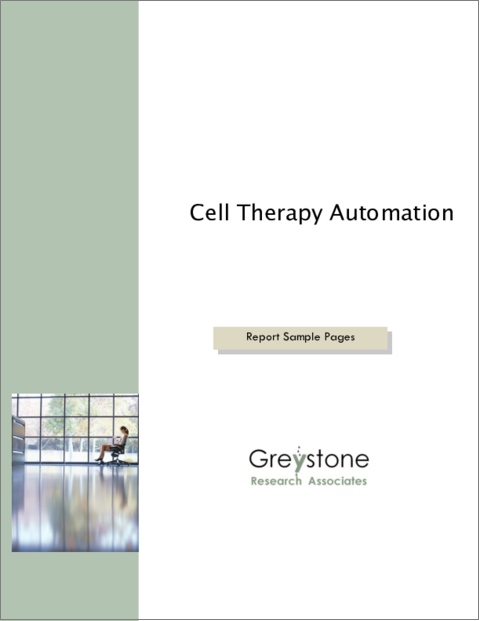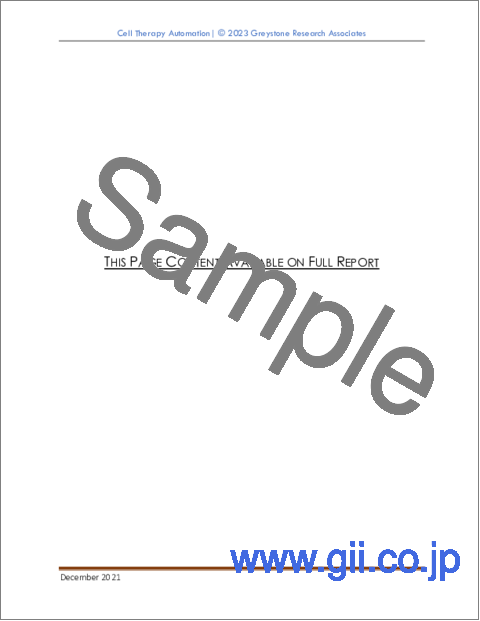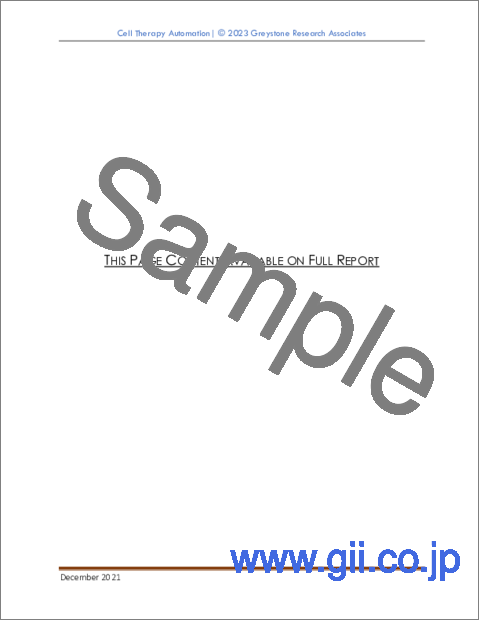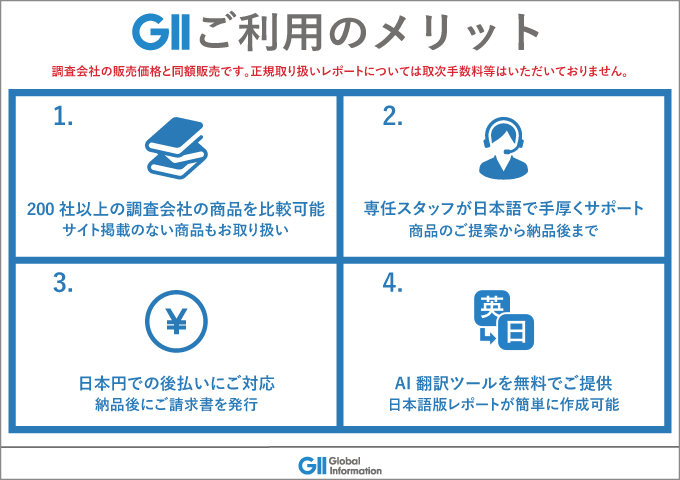|
|
市場調査レポート
商品コード
1186036
細胞治療の自動化市場:技術、治療法、戦略、予測Cell Therapy Automation: Technologies, Therapeutics, Strategies & Forecasts |
||||||
| 細胞治療の自動化市場:技術、治療法、戦略、予測 |
|
出版日: 2023年01月17日
発行: Greystone Research Associates
ページ情報: 英文 85 Pages
納期: 即日から翌営業日
|
- 全表示
- 概要
- 目次
当レポートでは、世界の細胞治療の自動化市場について調査し、市場の概要とともに、セグメント別の技術動向、市場影響要因、および市場に参入する企業のプロファイルなどを提供しています。
目次
エグゼクティブサマリー
セルオートメーション技術
- 市場セグメント
- 競合技術
- バイオリアクター
- マイクロキャリア
- 人口統計と成長
- 市場促進要因
- 危険因子
細胞培養モニタリング
- プローブベースセンサー
- 電気化学センサー
- 光化学センサーシステム
- カプセル技術
- ディスポーザルセンサーパッチ
- 品質管理
- CMC
- 分光センサー
- 技術的課題
- 電子干渉
実現技術
- 自律センサー技術
- 無線データ伝送
- 検体濃度
- 技術的な制限
自動細胞療法製造プラットフォーム
- 次世代プラットフォーム
市場要因
- 規制
- FDA
- GMP
企業プロファイル
“ Cell Therapy Automation: Technologies, Therapeutics, Strategies & Forecasts ” is a comprehensive evaluation and analysis of the technology, products and participants providing the driving force behind this growing oncolytic segment of the immunological therapy sector. The report has been designed and developed to provide pharmaceutical company decision makers, drug developers and formulators, device designers, and industry strategists with a detailed understanding of the expanding impact of cell therapy on pharmaceutical strategies and healthcare treatment protocols. Provider organization business managers, healthcare administrators and investors will also benefit from this publication.
Converging Factors Driving Cell Therapy Developments
Cell therapy has emerged as a promising new approach to treat malignancies that could only be treated on a palliative basis. Among those therapies, chimeric antigen receptor (CAR) modified T cell therapies has proved to be effective for hematological malignancies. To generate CAR T cells, patient- (autologous) or donor-derived (allogeneic) T cells are modified to express a CAR. The CAR is a chimeric construct containing at least one signaling domain of the T cell receptor and a single chain variable fragment (scFv).
The production of autologous CAR T cells is carried out by a variety of manufacturing approaches all comprising the same common steps. First, the patient's white blood cells (WBCs) are isolated by leukapheresis and washed. Then, the T cells are activated, transduced with the CAR transgene, expanded to the required cell numbers for therapy, formulated and filled. After quality control testing and preparatory lymphodepleting chemotherapy for the patient, the product is injected into the patient.
What You Will Learn:
- What current treatments are supplied as cell therapy treatments, how are they administered, what are the specifics, and who markets them?
- What cell Therapy treatments are in development, who are the developers, and what indications are they targeting?
- What are the major factors driving cell therapy demand?
- What is the size of the market today, who are the market share leaders, and what will the market share be in 2028?
- How important are drug developer relationships and what are the key alliances in the industry?
- What are the essential tech factors, technologies and market development issues for cell therapy products?
- What are the significant economic, technology, and regulatory factors affecting the market for cell therapy treatments?
Table of Contents
Executive Summary
Cell Automation Technologies
- Market Segments
- Competing Technologies
- Bioreactors
- Microcarriers
- Demographics and Growth
- Market Drivers
- Risk Factors
Cell Culture Monitoring
- Probe Based Sensors
- Electrochemical Sensor
- Optical Chemosensor Systems
- Capsule Technology
- Disposable Sensor Patches
- Quality Control
- CMC
- Spectroscopic Sensors
- Technical Challenges
- Electronic Interference
Enabling Technology
- Autonomous Sensor Technology
- Wireless Data Transmission
- Analyte Concentration
- Photoluminescence Intensity
- Absorption
- Technical Limitations
- Electronic Interference
Automated Cell Therapy Manufacturing Platforms
- Next Generation Platforms
- Cell Therapy Process Convergence
- CT Process Standardization
- Robotics
Market Factors
- Regulations
- FDA
- GMP




